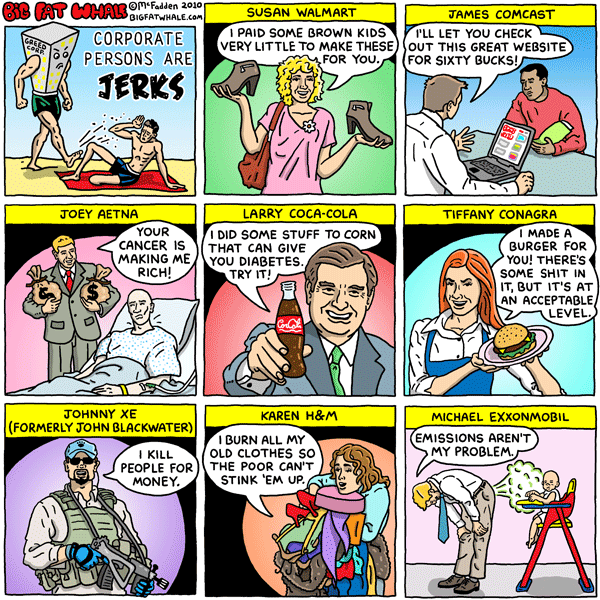The movement to amend the U.S. Constitution to get corporate money out of elections is picking up some serious steam.
Tens of thousands of activists across the country have already signed PFAW's petition calling for an amendment ... in November and December, thousands of Americans attended hundreds house parties nationwide -- organized by PFAW, Public Citizen, Move To Amend and other allies, and joined by Sen. Bernie Sanders and Jim Hightower -- to mobilize and plan for a day of action on the upcoming January 21st second anniversary of Citizens United v. FEC, the Supreme Court decision that unleashed unlimited corporate spending in our elections. Organizing meetings are taking place now and our movement was just this week featured on TV on both The Dylan Ratigan Show and The Young Turks.
It's high time YOU got on board!
Please take a moment to add your name to the petition now and help restore Government By the PEOPLE!
TEN bills proposing a constitutional amendment to overturn the Citizens United decision have been introduced in the current Congress -- including one by Rep. Ted Deutch to expressly exclude for-profit corporations from the rights given to natural persons by the Constitution, prohibit corporate spending in all elections, and affirm the authority of Congress and the States to regulate corporations and to regulate and set limits on all election contributions and expenditures.
Here's just a glimpse of the growing national movement!
Tens of thousands of activists across the country have already signed PFAW's petition calling for an amendment ... in November and December, thousands of Americans attended hundreds house parties nationwide -- organized by PFAW, Public Citizen, Move To Amend and other allies, and joined by Sen. Bernie Sanders and Jim Hightower -- to mobilize and plan for a day of action on the upcoming January 21st second anniversary of Citizens United v. FEC, the Supreme Court decision that unleashed unlimited corporate spending in our elections. Organizing meetings are taking place now and our movement was just this week featured on TV on both The Dylan Ratigan Show and The Young Turks.
It's high time YOU got on board!
Please take a moment to add your name to the petition now and help restore Government By the PEOPLE!
TEN bills proposing a constitutional amendment to overturn the Citizens United decision have been introduced in the current Congress -- including one by Rep. Ted Deutch to expressly exclude for-profit corporations from the rights given to natural persons by the Constitution, prohibit corporate spending in all elections, and affirm the authority of Congress and the States to regulate corporations and to regulate and set limits on all election contributions and expenditures.
Here's just a glimpse of the growing national movement!
- In Colorado, the Jamestown Board of Trustees unanimously passed a resolution calling for a constitutional amendment establishing that only human beings, not corporations, are entitled to constitutional rights and that the First Amendment does not protect unlimited political spending as free speech. And voters in Boulder City passed a ballot measure calling for an amendment to the US Constitution that would state that corporations are not people and reject the legal status of money as free speech.
- In California, the city councils of Fort Bragg, Richmond, Marina, Point Arena and Aracata, Oakland and Los Angeles passed resolutions last year supporting an amendment to make sure corporations don't have the same free speech rights as people in elections.
- Missoula, Montana voters approved a local ballot referendum urging Congress to propose a constitutional amendment that clearly states that corporations are not people and do not have the same rights as citizens by a three to one margin.
- Residents of Monroe, Maine passed a Local Self-Governance Ordinance stating that "no corporation doing business within the Town of Monroe shall be recognized as a ‘natural person’ under the United States or Maine Constitutions or laws of the United States or Maine."
And the councils of Chapel Hill, NC, Duluth, MN, Pueblo County, CO and New York City just recently passed resolutions supporting a constitutional amendment to overturn Citizens United.
It's time to add your name to PFAW's petition to Congress calling for constitutional amendment now and help us get from our current number of signers -- 75,000 -- to 100K!
Generations of Americans have come together to force much-needed change by amending the U.S. Constitution to expand democracy and protect fundamental rights. With the voice of the voter being increasingly drowned out by unlimited corporate spending in elections, the need has arisen again. Now, it's our generation's turn.
Please speak out now.
Thank you for standing up against corporate power run amok and for Government By the People
It's time to add your name to PFAW's petition to Congress calling for constitutional amendment now and help us get from our current number of signers -- 75,000 -- to 100K!
Generations of Americans have come together to force much-needed change by amending the U.S. Constitution to expand democracy and protect fundamental rights. With the voice of the voter being increasingly drowned out by unlimited corporate spending in elections, the need has arisen again. Now, it's our generation's turn.
Please speak out now.
Thank you for standing up against corporate power run amok and for Government By the People
 Helping to kick off the 2010 ACS National Convention, Sen. Al Franken criticized Republican efforts to scuttle the Obama administration's nominations to the federal courts and numerous administration positions.
Helping to kick off the 2010 ACS National Convention, Sen. Al Franken criticized Republican efforts to scuttle the Obama administration's nominations to the federal courts and numerous administration positions. 








